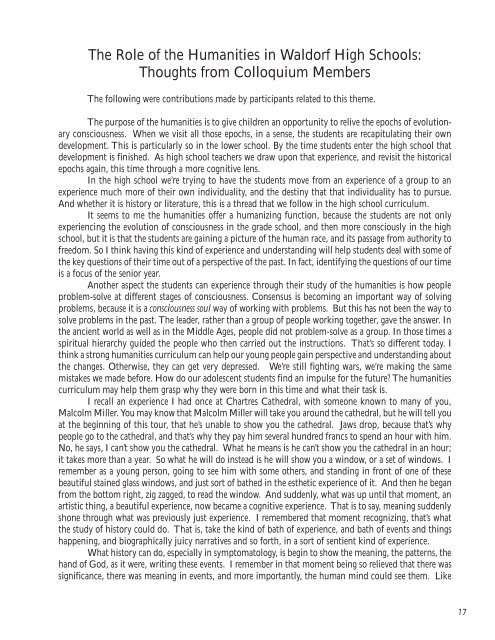Proceedings Colloquium on World History - Waldorf Research Institute
Proceedings Colloquium on World History - Waldorf Research Institute
Proceedings Colloquium on World History - Waldorf Research Institute
Create successful ePaper yourself
Turn your PDF publications into a flip-book with our unique Google optimized e-Paper software.
The Role of the Humanities in <strong>Waldorf</strong> High Schools:<br />
Thoughts from <str<strong>on</strong>g>Colloquium</str<strong>on</strong>g> Members<br />
The following were c<strong>on</strong>tributi<strong>on</strong>s made by participants related to this theme.<br />
The purpose of the humanities is to give children an opportunity to relive the epochs of evoluti<strong>on</strong>ary<br />
c<strong>on</strong>sciousness. When we visit all those epochs, in a sense, the students are recapitulating their own<br />
development. This is particularly so in the lower school. By the time students enter the high school that<br />
development is finished. As high school teachers we draw up<strong>on</strong> that experience, and revisit the historical<br />
epochs again, this time through a more cognitive lens.<br />
In the high school we’re trying to have the students move from an experience of a group to an<br />
experience much more of their own individuality, and the destiny that that individuality has to pursue.<br />
And whether it is history or literature, this is a thread that we follow in the high school curriculum.<br />
It seems to me the humanities offer a humanizing functi<strong>on</strong>, because the students are not <strong>on</strong>ly<br />
experiencing the evoluti<strong>on</strong> of c<strong>on</strong>sciousness in the grade school, and then more c<strong>on</strong>sciously in the high<br />
school, but it is that the students are gaining a picture of the human race, and its passage from authority to<br />
freedom. So I think having this kind of experience and understanding will help students deal with some of<br />
the key questi<strong>on</strong>s of their time out of a perspective of the past. In fact, identifying the questi<strong>on</strong>s of our time<br />
is a focus of the senior year.<br />
Another aspect the students can experience through their study of the humanities is how people<br />
problem-solve at different stages of c<strong>on</strong>sciousness. C<strong>on</strong>sensus is becoming an important way of solving<br />
problems, because it is a c<strong>on</strong>sciousness soul way of working with problems. But this has not been the way to<br />
solve problems in the past. The leader, rather than a group of people working together, gave the answer. In<br />
the ancient world as well as in the Middle Ages, people did not problem-solve as a group. In those times a<br />
spiritual hierarchy guided the people who then carried out the instructi<strong>on</strong>s. That’s so different today. I<br />
think a str<strong>on</strong>g humanities curriculum can help our young people gain perspective and understanding about<br />
the changes. Otherwise, they can get very depressed. We’re still fighting wars, we’re making the same<br />
mistakes we made before. How do our adolescent students find an impulse for the future? The humanities<br />
curriculum may help them grasp why they were born in this time and what their task is.<br />
I recall an experience I had <strong>on</strong>ce at Chartres Cathedral, with some<strong>on</strong>e known to many of you,<br />
Malcolm Miller. You may know that Malcolm Miller will take you around the cathedral, but he will tell you<br />
at the beginning of this tour, that he’s unable to show you the cathedral. Jaws drop, because that’s why<br />
people go to the cathedral, and that’s why they pay him several hundred francs to spend an hour with him.<br />
No, he says, I can’t show you the cathedral. What he means is he can’t show you the cathedral in an hour;<br />
it takes more than a year. So what he will do instead is he will show you a window, or a set of windows. I<br />
remember as a young pers<strong>on</strong>, going to see him with some others, and standing in fr<strong>on</strong>t of <strong>on</strong>e of these<br />
beautiful stained glass windows, and just sort of bathed in the esthetic experience of it. And then he began<br />
from the bottom right, zig zagged, to read the window. And suddenly, what was up until that moment, an<br />
artistic thing, a beautiful experience, now became a cognitive experience. That is to say, meaning suddenly<br />
sh<strong>on</strong>e through what was previously just experience. I remembered that moment recognizing, that’s what<br />
the study of history could do. That is, take the kind of bath of experience, and bath of events and things<br />
happening, and biographically juicy narratives and so forth, in a sort of sentient kind of experience.<br />
What history can do, especially in symptomatology, is begin to show the meaning, the patterns, the<br />
hand of God, as it were, writing these events. I remember in that moment being so relieved that there was<br />
significance, there was meaning in events, and more importantly, the human mind could see them. Like<br />
17
















